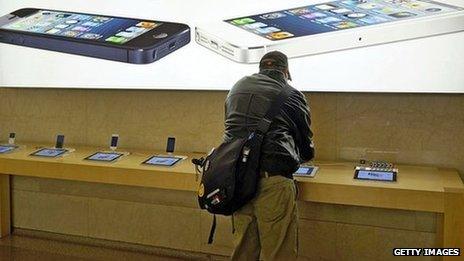Apple tax and the Irish connection - Senate
- Published

Apple has been called "an American success story" by the Senate panel
Apple's tax methods have been unpicked by a US Senate committee that has accused the company of being "among America's largest tax avoiders".
Carl Levin, chairman of the Senate Permanent Subcommittee on Investigations, said Apple, making use of the tax system in the Republic of Ireland, "shifts billions of dollars in profits offshore" that should be subject to US taxes.
He said Apple had a highly developed tax avoidance system through which it had amassed more than $100bn (拢66bn) in offshore cash.
The committee said Apple - which Mr Levin called "an American success story" - had created a "complex process" to avoid paying taxes. His committee had earlier said there had been no indication the firm had acted illegally.
In its Apple said it "does not use tax gimmicks".
That assertion was questioned by tax expert Prof Richard Harvey, of Villanova University, who opened his testimony to the Senate committee by saying he "almost fell out of my chair" when he heard the remark.
Tax avoidance 'staples'
Mr Levin outlined what he and his colleagues said were "a complex web of offshore entities" that Apple used to avoid paying billions of dollars in US taxes.
The Democratic senator for Michigan said sending valuable intellectual property rights offshore - together with the profits that follow those rights - was at the heart of Apple's tax-avoidance strategy.
Unlike more tangible, physical assets, he said, the value of those property rights could be transferred around the globe, often with just a few keyboard strokes.
"Some of Apple's techniques are staples of international tax avoidance, such as its use of what is known as a 'cost sharing agreement' between the parent company and its offshore subsidiaries, and its use of so-called 'check-the-box' regulations," he said.
'Holy Grail'
But he added that many of Apple's other measures were "unique".
"Apple has sought the Holy Grail of tax avoidance, offshore corporations that it argues are not, for tax purposes, resident in any nation." said Mr Levin.
He explained how the tech company had made the most of a loophole in the Irish tax code that was designed to help the country compete with other countries for investment and jobs.
It meant the iPhone maker was able to funnel profits into Republic of Ireland-incorporated subsidiaries or "ghost companies" that had "no declared tax residency anywhere in the world".
Under Irish law, only companies that are managed and controlled in Ireland are considered Irish residents for tax purposes.
Hence, Apple Operations International (AOI), Apple Sales International (ASI) and Apple Operations Europe - through which much of the Apple group's overseas income has flowed - are all incorporated in Ireland but are not deemed to be tax resident there, as they are not managed and controlled in the country.
But US tax law, on the other hand, generally turns on where a company is incorporated, not on where it is managed and controlled.
Apple has arranged matters so it can claim that these offshore entities, for tax purposes, exist nowhere.
'Tax haven'
The firm designated its Irish entities as unlimited companies, which meant it did not have to publish annual accounts. The Senate inquiry has been the first time the structure has been publicly revealed.
The Irish arrangement allowed Apple to pay just 1.9% tax on its $37bn in overseas profits in 2012, despite the fact average the tax rate in the OECD countries that make up its main markets was 24% last year.
In a 40-page memorandum, the Senate committee says: "Ireland has essentially functioned as a tax haven for Apple."
The Irish government has said the country is not to blame for Apple's low global tax payments, and that it had no special-rate deal with the company.
- Published21 May 2013
- Published21 May 2013
- Published19 May 2013
- Published1 May 2013
- Published20 September 2012
- Published21 May 2013
- Published4 December 2012